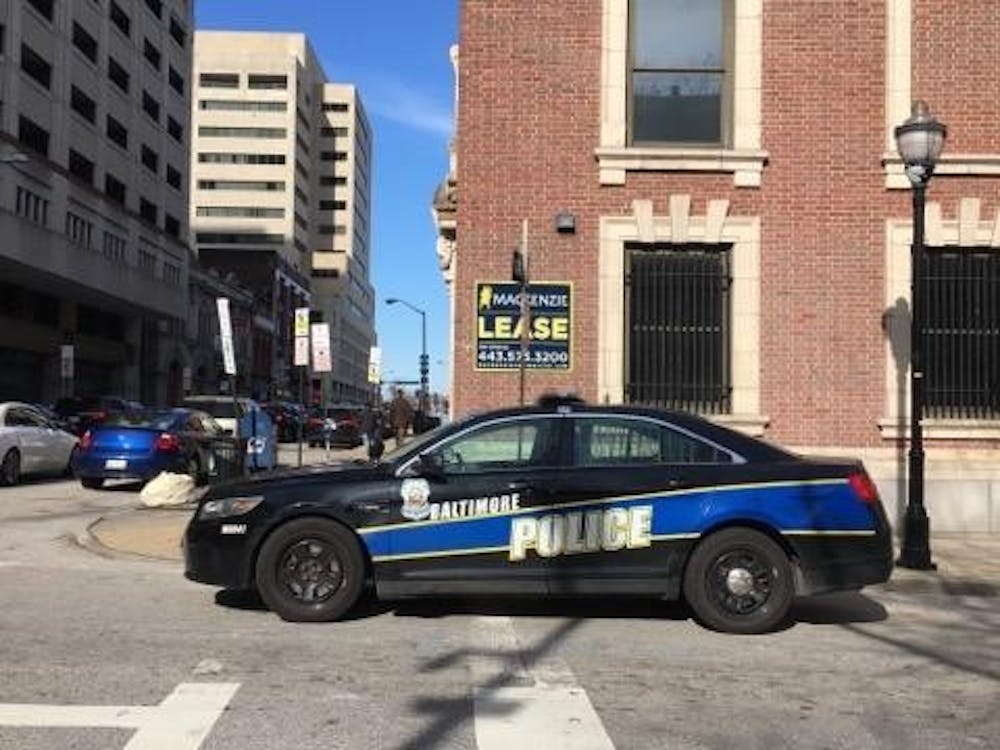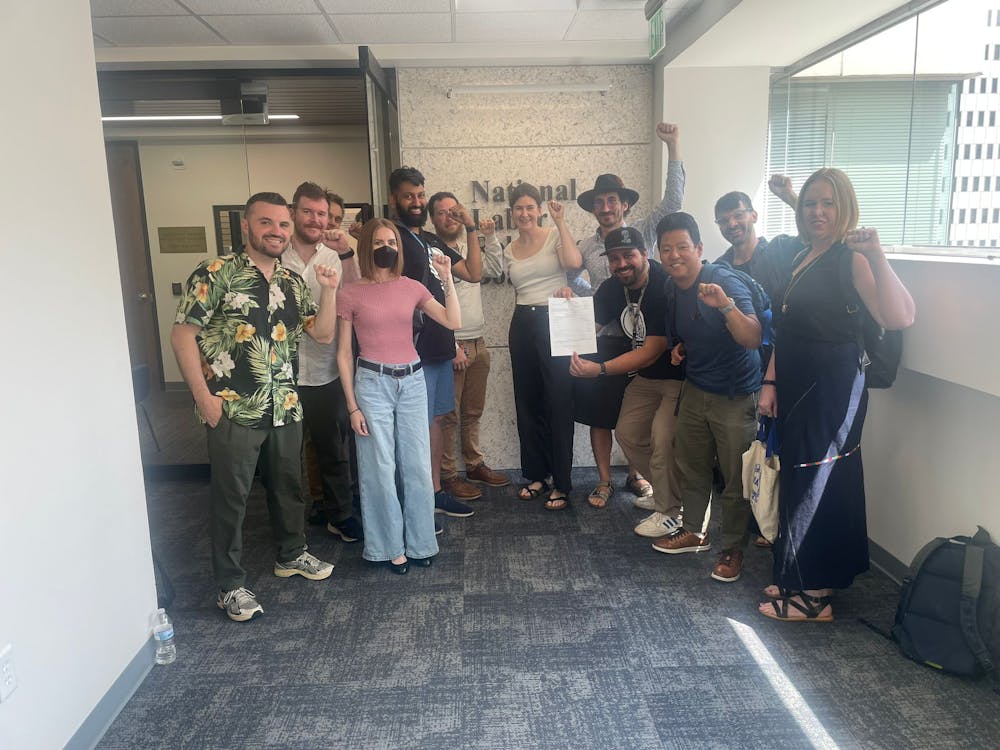Last Friday Hopkins affiliates and Baltimore residents traveled to Annapolis to testify both for and against legislation that would allow Hopkins to create a private police force.
Members of the Maryland General Assembly heard testimony on Senate Bill (SB) 793 and House Bill (HB) 1094, each titled “Community Safety and Strengthening Act.” In addition to authorizing the Hopkins police force, the bills also include funding for youth programs in Baltimore.
Senator Antonio Hayes is sponsoring SB 793 at the University’s request, while Delegates Cheryl Glenn, Curt Anderson, Talmadge Branch, Keith Haynes, Maggie McIntosh and Samuel Rosenberg are sponsoring HB 1094.
Members of the public spoke before three committees: the Senate’s Judicial Proceedings Committee, the House Judiciary Committee and the Baltimore City delegation.
A panel of University administrators testified first. The panel included President Ronald J. Daniels, Vice President for Security Melissa Hyatt and Hopkins Hospital President Redonda Miller.
In his remarks, Daniels described how the legislation had evolved since it was first introduced last year. After the original bill failed to pass because of opposition from Hopkins affiliates and Baltimore community members, lawmakers requested that University officials conduct more research and community outreach before revising the bills.
In an interview with The News-Letter on Wednesday, Daniels said that he and other Hopkins officials have not considered concrete alternatives if the bills do not pass.
“We’re not thinking a lot about what happens if [the legislation] doesn’t pass, we are cautiously optimistic that the legislation will pass this year,” Daniels said.
During his testimony on Friday Daniels disagreed with the characterization of the police force as a private one.
“I believe this is, and can be, public policing at its best – created by you as a public body and subjected by law to public reporting, public oversight, public involvement and public standards,” he said.
Corey Payne, a PhD student who attended the Baltimore City delegation proceedings, was struck by this statement in Daniels’ testimony.
He wrote in an email to The News-Letter that he believes that rejection of the notion that the legislation is creating a private police force is an attempt to reduce criticism to the bills.
“He tried, much like in the online advertisements floating around Baltimore, tried to change the definition of the word ‘private’ in order to avoid legitimate criticism,” he wrote. “In the next statement, he recognized Hopkins as a part of the private sector in Baltimore.”
Garrett Patrick, a third-year MD-PhD student at the School of Medicine, spoke in favor of the bills in the House and the Senate. He lives in a neighborhood adjacent to the East Baltimore Campus where the proposed force would likely patrol.
Patrick’s support for the bills arose from his personal experience and conversations with his neighbors.
“We have seen a little bit of everything: We’ve had arson, break-ins, muggings,” Patrick said. “My neighborhood ending up voting almost unanimously in favor of the bill.”
On the Wednesday before the proceedings, Patrick began an online petition for medical students to voice support for the legislation.
“I got a lot of signatures and emails in response to the petition, but a lot of those people asked to remain anonymous because they were afraid of the personal and professional consequences of speaking out in favor of it,” he said.
In addition to establishing a Hopkins police force, the bills also includes measures to hold the force responsible in the form of an accountability board comprised of 15 members, which includes students, faculty and staff of the University and community members belonging to the neighborhoods surrounding the University’s main campuses.
Tyrel Williams, a community member, spoke about his work with Daniels to create this accountability board.
He detailed his own initial opposition to a private institution with additional powers, and his efforts to work with Hopkins to create what he thought would be the most accountable police force possible.
“If we are going to gain safety, we must come up with a comprehensive safety policy,” he said. “We believe we have helped Hopkins get to and create a system of accountability.”
Jackson Gilman-Forlini, a Baltimore community member, criticized this model of accountability during his testimony.
“The accountability board as proposed is little more than an advisory committee filled with people from Hopkins,” Gilman-Forlini said.
In an interview with The News-Letter, on the other hand, Daniels argued that a Hopkins force would in fact remain accountable.
“We are adamantly opposed to any racial profiling whatsoever. That is not an acceptable practice and we are determined that in the establishment of a sworn police force, that practice will not occur. There is no equivocation on that,” he said.
Daniels added that there are measures in place to ensure that the police force will be accountable.
“Through a number of different mechanisms which have been set out in the legislation from the accountability board, to the publication of data to annual reports to oversight by the civilian review panel, there are a number of safeguards there that will mitigate the prospects for that kind of behavior,” he said.
Though he acknowledged that racial profiling and systemic biases are legitimate concerns in today’s political climate, Daniels maintained that the legislation would be drafted in way that would alleviate these concerns.
“We have been very cognizant of those concerns in the way in which we’ve supported the drafting of legislation that would address them,” he said.
In an interview with The News-Letter, AJ Tsang, executive president of the Student Government Association (SGA), shared his experience testifying at the hearings.
The results of personal conversations with students as well as preliminary results from an omnibus referendum compelled Tsang to travel to Annapolis. The referendum, conducted by SGA, asked undergraduates whether they support the creation of a private police force, to which 74.76 percent responded “no.”
“It was my duty to testify and relay what I am hearing from the student body to the legislators making actual policy changes which will affect us on campus,” he said.
Senator Hayes’ major criticism of the first version of SB 793 was that it did not address root causes of crime. As a Baltimore native, Hayes emphasized his commitment to the city. He said that understanding and attempting to mitigate environmental factors is necessary to reduce crime.
“Whether it’s Baltimore City police, Hopkins police or Morgan State University police, you can’t address the public safety issues in our city just with police. So I think that was their best attempt in trying to make sure that what they were proposing to the legislature wasn’t exclusively just police,” he said.
Hayes stated that he saw the legislation’s inclusion of funding for youth programs as a step in the right direction.
The legislation calls for the State of Maryland to provide funding for programs such as the Baltimore City YouthWorks Summer Jobs Program and the Baltimore Children and Youth Fund.
Hayes also clarified concerns raised by legislators that the funding for the community programs would be provided by the state.
“Although that money would be available from the state, in most of those cases it requires a match from institutions like Hopkins or any other institutions that would want to invest in the neighborhoods and communities, which we are concerned about,” he said.
Kevin Cleary, a community member who spoke at the proceedings in favor of the bills, believes that the planned economic development and the establishment of programs like the Law Enforcement Cadet Apprenticeship program, strengthens the legislation.
“This bill contributes to long-term stabilization of the city and will get resources to the kids that need them,” he said.
Sophomore Celeste O’Conner attended the hearings in Annapolis,.She stated that she thought the bills were likely to pass based off the proceedings.
O’Conner also claimed that although she felt there were some delegates that valued the opposing testimonies, she saw the bills passing because of lobbyists hired by the University.
Still, O’Conner said that the presence of student body opposition did have an impact.
“It made a difference that we were there, hopefully,” O’Conner said. “If not in terms of the bill getting passed, hopefully in terms of getting press and getting people to talk about this.”
Overall, sophomore Sabrina Epstein was encouraged that some of the delegates and state senators seemed to value students’ voices.
However, she noted that as a student it is difficult to remain actively involved; she noted that students were doing homework between sessions.
“It will be interesting to see how this plays out because, unfortunately, the administration has a lot more resources than we do. We are all students having to give up our days,” Epstein said.
She also said that Students Against Private Police (SAPP), would be telephoning and emailing Baltimore City legislators in the days leading up to the vote.
Quinn Lester, a PhD student and member of SAPP, described both plans of action in response to whether or not the legislation is passed.
“If the bill gets passed, we will keep fighting anyway we can and try to push for amendments via the Baltimore City Council,” Lester said. “If it doesn’t pass, we will turn our focus to improving current campus security problems.”
In an interview with The News-Letter, Daniels asserted that the legislation had improved since last year.
“We are hearing from a number of stakeholders and others that they think that the legislation has evolved in ways which meet a number of the concerns and criticisms that were raised earlier, and so we’re hoping, that it will be passed this year,” he said.





